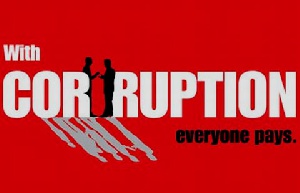Reverend John Nkum, a Management Consultant and Organisational Review Strategist, says Ghana must make anti-corruption profitable by ensuring that portion of the monies retrieved from perpetrators of corruption are paid to the investigating agency to resource them.
He said if the country wanted to tackle corruption seriously then she must strictly adhere to the anti-corruption value chain approach.
The chain includes intensifying public education and awareness about how corruption destroyed the society, tracking and monitoring transactions of corruption at different forms and levels.
Others are; undertaking investigation and research to gather evidence of cases of corruption, publicising the evidence to inform the public about those involved and follow up with advocacy to prosecute perpetrators as well as publicise the sanctions meted out to the offenders.
Rev. Nkum, who is also the Executive Director of Nkum Associates, said this at a stakeholders’ review meeting with journalists in Accra on Monday.
The meeting was to solicit media practitioners’ perspectives on the Ghana Anti-Corruption Coalition’s (GACC) National Anti-Corruption Plan Strategy, which was implemented from 2010 to 2015 and assess the success chalked so far.
It also aimed at identifying the strengths and weaknesses of the GACC strategy and provide recommendations for a new anti-graft strategy, which would commence this year for the next five years.
GACC is a unique cross-sectoral grouping of eight public, private and civil society organisations with a focus on promoting good governance and fighting corruption in Ghana.
Some organisations constituting the GACC include the Economic and Organised Crime Office, the Commission on Human Rights and Administrative Justice, the Ghana Journalists Association and other civil society organisations.
Rev. Nkum said; “As a nation we should go beyond just publicising corruption cases but rather follow up on the prosecution and sanctions meted out the offenders.”
In addition, he said, the media and other anti-graft institutions should provide the public technical reasons the prosecution team failed to convict an alleged corrupt official.
This, he said, would sharpen public understanding of the Law and make them tolerant.
Rev. Nkum called for capacity-build of cadre of journalists so that their reportage on anti-corruption cases would be more professional.
Journalists and media organisations must have access to anti-graft personalities and professionals to have insight into anti-corruption activities and follow up on cases, he said.
He said Ghana’s Special Prosecutor’s Office should be modelled along best international practices and must be autonomous so that it could even prosecute the President or the Executive arm of Government when they involve themselves in corrupt practices.
Mr Bright Sowu, a Senior Research Officer at the GACC, said the Coalition supported some journalists to undertake investigations and follow up on some corrupt cases that came to their notice under a project called “Accountable Democratic Institution,” which was implemented for three years.
He called for a holistic approach towards fighting corruption by involving all relevant state institutions.
Some media practitioners who participated in the meeting observed that the Coalition had done well by championing anti-corruption in the country as well as providing information on some corrupt cases.
They called for the National Anti-Corruption Action Plan Document to be made available to journalists so that they could track and monitor corrupt practices.
They asked state institutions like the Attorney-General’s Office to put their act together so that they could successfully prosecute corruption cases and retrieve monies embezzled by public officials.
The media coverage on resolution of corrupt cases was weak and the participants, therefore, called for media hype on monies paid by offenders to the State.
The GACC has, over the years, worked on several interventions and engaged government, private sector institutions, civil society organisations, development partners and other key stakeholders at the local, national, regional and global levels.
General News of Tuesday, 22 August 2017
Source: ghananewsagency.org













